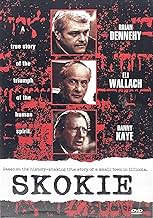VALUTAZIONE IMDb
7,2/10
439
LA TUA VALUTAZIONE
Aggiungi una trama nella tua linguaA dramatization of the controversial trial concerning the right for Neo-Nazis to march in the predominately Jewish community of Skokie.A dramatization of the controversial trial concerning the right for Neo-Nazis to march in the predominately Jewish community of Skokie.A dramatization of the controversial trial concerning the right for Neo-Nazis to march in the predominately Jewish community of Skokie.
- Regia
- Sceneggiatura
- Star
- Candidato a 3 Primetime Emmy
- 2 vittorie e 4 candidature totali
Trama
Lo sapevi?
- QuizThis would be the final appearance of Danny Kaye before motion picture cameras, and the last of only two dramatic performances. The other performance being the "Ragpicker," in the 1969 film La pazza di Chaillot (1969) starring Katharine Hepburn.
- BlooperOne actress seen in the synagogue protesting the Nazi march is seen later in the ACLU office answering phones and defending the Nazi march.
- Citazioni
Max Feldman: If the Nazis march in here in Skokie, you can believe me I will be there. I will be there with baseball bats, with a gun, with anything. I will be in Skokie if the Nazis will march.
- ConnessioniFeatured in The 34th Annual Primetime Emmy Awards (1982)
Recensione in evidenza
To me, this was an excellent movie. This was one of my favorite movies of all time. Forget Schindler's list, to me this movie was a much better in certain aspects for emotion. One of the best scenes in this motion picture (one that in the 4 minutes it takes to play invokes more emotion from me as the viewer than all Schindler's list) is where Danny Kaye as Max Feldman answers his daughter's question about what happened to her grandparents. Max and his wife - holocaust survivors, have kept the horrors of the camps from their daughter. She has very little knowledge of what happened and at 13 or 14 she asks questions. Danny Kaye (Max) takes the time (against his wife's wishes) to finally tell his daughter. The strength and power of this single scene rests with the unemotional and matter of fact way that Max explains the nature of the death camp to his daughter. No emotion on the part of Max - - the character is breaking up inside yet is telling his daughter what the Nazis did to his parents in a manner to spare her the emotion. This while his wife is listening from around the corner quietly falling to pieces. You know the deep emotion that he has with the issues when he attends a meeting to discuss the question of Nazi's marching in Skokie with the vehemence and passion he holds on the issue. Yet he holds back this emotion with his daughter. Like I said, this few minutes of the movie is more powerful than the total Schindler's list - in my opinion. The full movie has its flaws, and covers the 1st amendment issues of American Nazi's right to march in detail, covering all sides of the issue. But this is a powerful movie and shows the depth of Danny Kaye's acting talents. A very surprising made for television movie about a very interesting topic. It is well done and very unlike Hollywood today.
I più visti
Accedi per valutare e creare un elenco di titoli salvati per ottenere consigli personalizzati
Dettagli
Contribuisci a questa pagina
Suggerisci una modifica o aggiungi i contenuti mancanti

Divario superiore
By what name was Diritto d'offesa (1981) officially released in Canada in English?
Rispondi


































